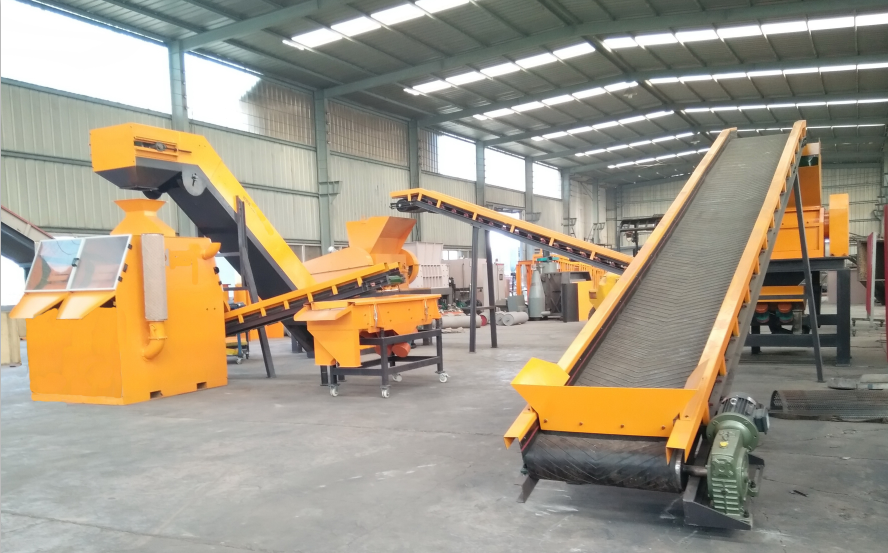

Aug . 16, 2024 15:52 Back to list
Exploring the Importance of Scrap Metal Grinders in Recycling and Sustainability
In today's world, where sustainability and efficient waste management are paramount, scrap metal grinders have emerged as crucial tools in the recycling industry. These powerful machines not only facilitate the processing of scrap metals but also contribute significantly to environmental conservation efforts. This article delves into the significance, functionality, and benefits of scrap metal grinders, highlighting their role in promoting a circular economy.
Understanding Scrap Metal Grinders
Scrap metal grinders are specialized machines designed to crush and grind scrap metal into smaller, more manageable sizes. They come in various forms, including horizontal grinders, vertical grinders, and hammer mills, each tailored to different types of metal and recycling needs. These grinders are built robustly to handle tough materials like steel, aluminum, copper, and other alloys, making them essential for metal recycling facilities.
The grinding process not only reduces the volume of scrap metal but also prepares it for further processing, such as smelting or refining. By breaking down large pieces of metal into smaller fragments, the grinders facilitate easier transport and enhance the efficiency of recycling processes.
The Role of Scrap Metal Grinders in Recycling
Recycling scrap metal is a critical component of waste management, significantly reducing the amount of waste sent to landfills. Scrap metal grinders play a pivotal role in this process by ensuring that metal is reused and repurposed rather than discarded. The grinding and shredding of scrap metals make it easier to separate different materials, allowing for more efficient sorting and recycling.

Moreover, recycled metal requires considerably less energy to produce than virgin metal. For instance, recycling aluminum saves up to 95% of the energy needed to create new aluminum from bauxite ore. By reducing energy consumption, scrap metal grinders contribute to lowering greenhouse gas emissions associated with metal production, supporting global efforts to combat climate change.
Economic and Environmental Benefits
The implementation of scrap metal grinders in recycling operations brings numerous economic and environmental benefits. Economically, recycling metals generates revenue for businesses and communities. The demand for recycled metals is constantly growing, driven by industries that aim to reduce production costs and their carbon footprint. By efficiently processing scrap metal, recyclers can capitalize on this demand, creating jobs and stimulating the economy.
Environmentally, the use of scrap metal grinders promotes sustainability by conserving natural resources and reducing pollution. Mining and refining new metals are resource-intensive processes that can harm ecosystems and consume vast landscapes. In contrast, recycling scrap metal minimizes the need for these processes, leading to less habitat destruction and reduced water and air pollution. Additionally, by minimizing waste through effective recycling practices, scrap metal grinders contribute to a cleaner and healthier environment.
Conclusion
In conclusion, scrap metal grinders are vital in modern recycling efforts, serving as the backbone of efficient metal processing. Their ability to reduce waste, conserve resources, and support economic growth underscores their importance in fostering a sustainable future. As industries increasingly prioritize circular economy principles, the role of scrap metal grinders will only become more prominent, ensuring that our metal resources are utilized to their fullest potential while mitigating environmental impacts. Embracing and investing in advanced grinding technologies will pave the way for a greener, more sustainable world where recycling becomes the norm rather than the exception.
Latest news
Troubleshooting Common Eddy Separator Problems
NewsJul.04,2025
The Role of Metal Recycling Plants in Circular Economy
NewsJul.04,2025
The Impact of Recycling Line Pickers on Waste Management Costs
NewsJul.04,2025
Safety Features Every Metal Shredder Should Have
NewsJul.04,2025
How Industrial Shredders Improve Waste Management Systems
NewsJul.04,2025
How Cable Granulators Contribute to Sustainable Recycling
NewsJul.04,2025